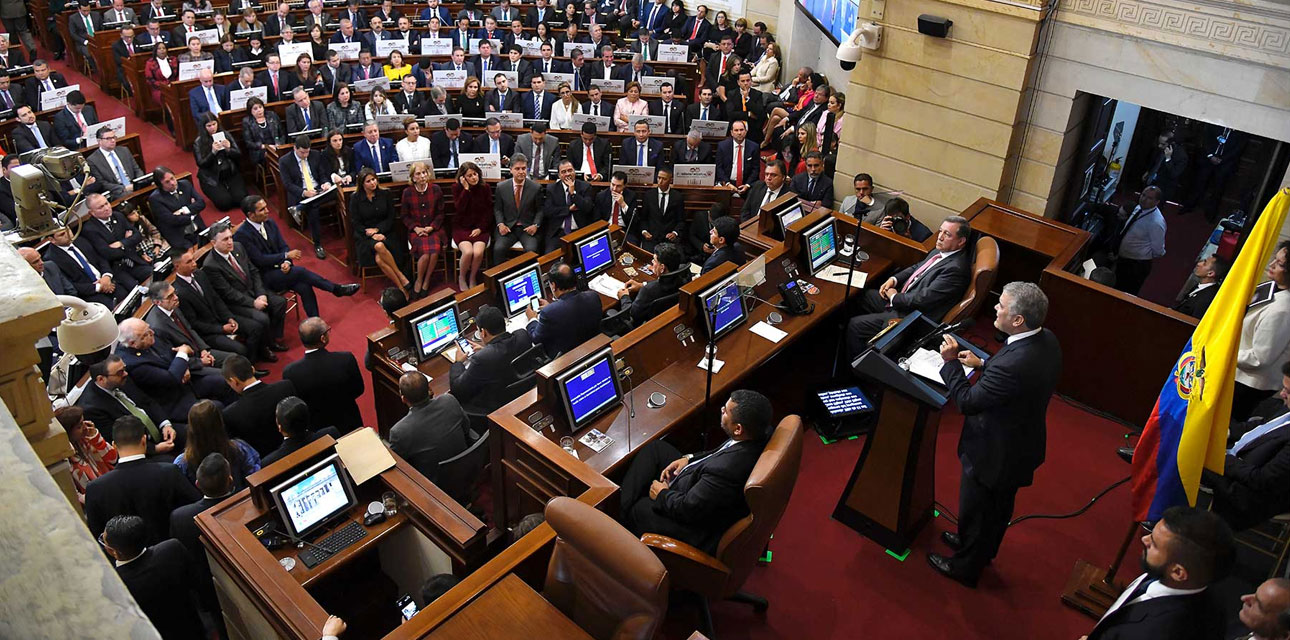Colombia’s President Ivan Duque on Saturday said he would step up his repressive anti-drug policy, and have no mercy for child rapists and his Venezuelan counterpart.
During his first speech to inaugurate a new congressional year, the president laid out the policy proposals he said he would pursue after having accomplished less than any 21st century president in his first year.
Recycled plan to curb coca with glyphosate
Most controversially, Duque confirmed that he would continue to seek the resumption of the aerial fumigation of coca with the possibly carcinogenic glyphosate, despite the Constitutional Court’s refusal to loosen conditions that would allow this.
“We will comply with all the necessary social and environmental requisites,” adding that “we understand that we must maintain the combination of the different tools we can use against this scourge.”
Last week’s court ruling stressed that Duque is obligated to continue a crop substitution program that is widely considered more effective, but has all but been suspended by the government.
Colombia insists on resuming aerial fumigation of coca despite court ruling
Recycled plans to punish child rapists
The president also said that he would seek lifetime imprisonment for child molesters and murderers after the case of a nine-year-old girl who was raped and murdered upset public opinion earlier this month.
The country’s medical examiner said in May already that child is raped every 20 minutes in Colombia, but this was ignored by Duque, as well as calls to allocate funds to the country’s family welfare agency that would allow it to effectively execute policies that could reduce sexual violence against children and end impunity in cases of sexual violence against children.
Instead, Duque said he would recycle proposals to impose life imprisonment that previously failed to make it through congress.
One child is raped every 20 minutes, Colombia’s medical examiner warns
Recycled anti-corruption proposals
Duque announced he would seek to push anti-corruption proposals through congress, a promise he made in August last year.
Partly due to the president’s own party, last year’s attempt was a complete failure; not one anti-corruption proposals made it through Congress.
This year, Duque would try it again with “a new anti-corruption proposal, coordinated with the Prosecutor General’s Office and the different political forces.”
Duque revokes transparency decree before announcing Colombia’s chief prosecutor candidates
Backing down on Venezuela?
Duque told Congress about his administration’s multiple attempts to end the “dictatorship” of disputed Venezuelan President Nicolas Maduro, which also led to nothing but more refugees fleeing the neighboring country’s crisis.
After failed attempts to trigger a coup and ongoing efforts by Norway to seek a way out of Venezuela’s crisis through talks between Maduro and opposition leader Juan Guaido, Duque toned down considerably.
“We will continue to lead the diplomatic isolation so that Venezuela can emerge from that dark night of the dictatorship and its social and economic collapse,” the president said, without announcing specific initiatives.
Decapitations take turf war over Colombia’s border with Venezuela to new level
That thing called war
The president reiterated his commitment to the reintegration of demobilized FARC rebels that has progressed slowly since former President Juan Manuel Santos signed a peace agreement in late 2016.
But the president was clear he would not tolerate any FARC members losing confidence and taking up arms again, vowing they would be persecuted exactly like before the peace deal.
Duque also reiterated his refusal to talk to the ELN, despite reiterated called by the church, social organizations and the international community to do so.
ELN shuts down southwest Colombia to commemorate 55th anniversary
Duque’s highlights tiny list of achievements
Despite his first year in office having been dubbed “the lost year” because the government’s failure to push legislation through Congress, Duque did his best to highlight achievements of the least effective administration of the 21st century.
According to Duque, 47,000 youngsters entered “Generation E,” an adapted version of his successor’s program that seeks to promote access to higher education for the poor.
Whether Duque’s second year in office will be more successful than his first seems unlikely.
Unlike in the previous year, his minority coalition is not in control of either the House or the Senate and Duque seems adamant to maintain a minority coalition of conservative and far-right parties.
And while the government plans on stepping up his repressive anti-drug policies, Congress is preparing to legalize marijuana.




